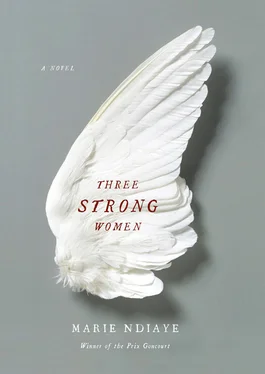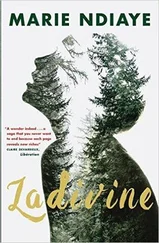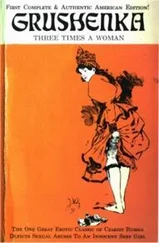Marie Ndiaye
Three Strong Women

 A ND THE MAN waiting for her at the entrance to the big concrete house — or who happened to be standing in the doorway — was bathed in a light so suddenly intense that it seemed to radiate from his whole body and his pale clothing: yet this short, thickset man before her, who’d just emerged from his enormous house and was glowing bright as a neon tube, no longer possessed, Norah straightaway realized, the stature, arrogance, and youthfulness once so mysteriously his own as to seem everlasting.
A ND THE MAN waiting for her at the entrance to the big concrete house — or who happened to be standing in the doorway — was bathed in a light so suddenly intense that it seemed to radiate from his whole body and his pale clothing: yet this short, thickset man before her, who’d just emerged from his enormous house and was glowing bright as a neon tube, no longer possessed, Norah straightaway realized, the stature, arrogance, and youthfulness once so mysteriously his own as to seem everlasting.
He held his hands crossed over his belly and his head tilted sideways; his hair was gray, and under his white shirt the belly sagged limply over the waistband of his cream trousers.
There he stood, bathed in cold light, looking as if he might have dropped to the threshold of his pretentious house from the branch of one of the poincianas with which the garden was filled, for — it had occurred to Norah — as she approached the house staring through the railings at the front door, she hadn’t seen it open to let her father out: and yet there he stood in the sunset, this glowing, shrunken man who at some point must have been dealt an enormous blow to the head that further reduced the harmonious proportions Norah remembered to those of a fat man, neckless with short, thick legs.
He stood there watching her as she approached; nothing in his rather lost, rather hesitant look indicated that he was expecting her, indeed that he’d asked, even begged, her to come and see him (insofar as a man like that, she thought, was capable of requesting help of any kind).
He was simply there, perhaps indeed having flitted down from the thick branch of a poinciana in whose yellow shade the house stood, to land heavily on the cracked concrete of the doorstep; and it was as if Norah had approached the railings at that instant by pure chance.
This man who could transform every entreaty on his part into an appeal made to him by someone else watched her opening the gate and entering the garden. He had the look of a host who was rather put out but trying to hide the fact; he was shading his eyes despite the fading of the light that had left the doorway in shadows but for his strange, shining, electric person.
“Well, well,” he said, “it’s you.” His speech was muffled and weak; despite his mastery of the language he was tentative in French, as if the unease he’d always felt over certain mistakes that were difficult to avoid now caused his voice to tremble.
Norah said nothing.
She gave him a quick hug but did not hold him tight: from the almost imperceptible way the flabby skin on her father’s arms shrank under her grasp she remembered how much he detested physical contact.
She thought she noticed a musty smell.
A smell emanating from the lush, wilting vegetation of the poinciana whose branches overhung the flat roof of the house and among whose leaves there perhaps nested this withdrawn and self-assured man ever on the alert — it pained Norah to imagine — for the slightest sound of footsteps approaching the gate at which he would take flight to land clumsily on the doorstep of his vast house with its rough concrete walls; or was it emanating — this smell — from her father’s body or his clothes or his old, wrinkled, ashen skin: she couldn’t say what it was, she’d no idea where it might be coming from.
At most she could say that this day he was wearing, and probably always wore now, a rumpled, sweat-stained shirt and trousers that were pale and shiny and hideously baggy at the knees, either the effect of his being too heavy a bird, one that fell over each time he landed, or — Norah reflected with rather weary compassion — of his having become after all another slovenly old man, indifferent or blind to lapses of hygiene while still clinging to the forms of conventional elegance, dressing as he’d always done in white and cream and never appearing on the threshold of his unfinished house without tightening the knot of his tie, whatever dusty room he’d emerged from, whatever poinciana, exhausted by flowering, he’d flown down from.
On landing at the airport Norah had taken a taxi, then walked in the heat for a long while because she’d forgotten her father’s exact address and only found her way after she’d recognized the house. She felt sticky, dirty, and spent.
She wore a sleeveless lime-green dress covered with little yellow flowers rather like those strewn over the doorstep under the poinciana, and flat sandals in the same soft green.
And she noticed with a start that her father wore plastic flip-flops, he who had always made a point, it seemed to her, of never appearing in anything other than polished shoes in off-white or beige.
Was it because this untidy man had lost the right to cast a stern or disapproving eye over her, or because, as a confident thirty-eight-year-old, she no longer worried above all else what people thought of her appearance? Whatever the case, fifteen years earlier — she knew — she would have felt mortified to have arrived tired and sweating before her father, whose own aspect and bearing never betrayed in those days the slightest sign of weakness or susceptibility during a heat wave, whereas now she couldn’t care less about showing him an un-made-up, shiny face that she hadn’t bothered to powder in the taxi. Telling herself, with a rather sour, rancorous cheer, He can think of me what he likes, she recalled the cruel casual insults of this superior male when as teenagers she and her sister came to see him: remarks that always turned on his daughters’ lack of elegance or want of lipstick.
She would have liked to say to him now, “You realize, don’t you, that you spoke to us as if we were women whose duty it was to make themselves attractive, whereas we were just kids, not to mention your own daughters.”
She would have liked to say this to him in a flippant, mildly reproachful way, as if all that had been just a rather crude form of humor on his part, and she’d have liked her father to show a little contrition, and for them to have laughed about it together now.
But seeing him standing there in his plastic flip-flops on the concrete doorstep strewn with rotting flowers perhaps knocked loose as he flew down from the poinciana on his tired, heavy wings, she realized that he no more would have understood or grasped the most insistent allusion to the nasty comments he used to make than he now cared to scrutinize her appearance and formulate a judgment about it.
He had a rather fixed, vacant, distant look.
She wondered then if he actually remembered having written asking her to come.
“Shall we go in?” she said, slipping her bag from one shoulder to the other.
“Masseck!” he shouted, clapping his hands.
The icy, bluish light seemed to shine more intensely from his misshapen body.
A barefoot old man in Bermudas and a torn polo shirt hurried forward.
“Take the bag,” Norah’s father ordered.
Then, turning to her, he said, “It’s Masseck, d’you recognize him?”
“I can carry my bag,” she said, immediately regretting her words, which could only have offended the servant, who, despite his age, was used to bearing the most awkward burdens, and so she passed it to him so impetuously that, being taken unawares, he tottered, before recovering his balance and tossing the bag onto his back, returned into the house with it, stooped over.
“When I last came,” she said, “it was Mansour. I don’t know Masseck.”
Читать дальше


 A ND THE MAN waiting for her at the entrance to the big concrete house — or who happened to be standing in the doorway — was bathed in a light so suddenly intense that it seemed to radiate from his whole body and his pale clothing: yet this short, thickset man before her, who’d just emerged from his enormous house and was glowing bright as a neon tube, no longer possessed, Norah straightaway realized, the stature, arrogance, and youthfulness once so mysteriously his own as to seem everlasting.
A ND THE MAN waiting for her at the entrance to the big concrete house — or who happened to be standing in the doorway — was bathed in a light so suddenly intense that it seemed to radiate from his whole body and his pale clothing: yet this short, thickset man before her, who’d just emerged from his enormous house and was glowing bright as a neon tube, no longer possessed, Norah straightaway realized, the stature, arrogance, and youthfulness once so mysteriously his own as to seem everlasting.










